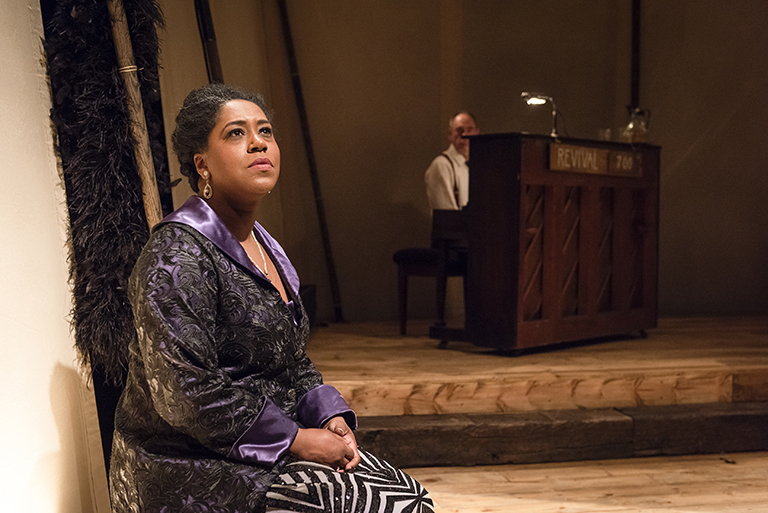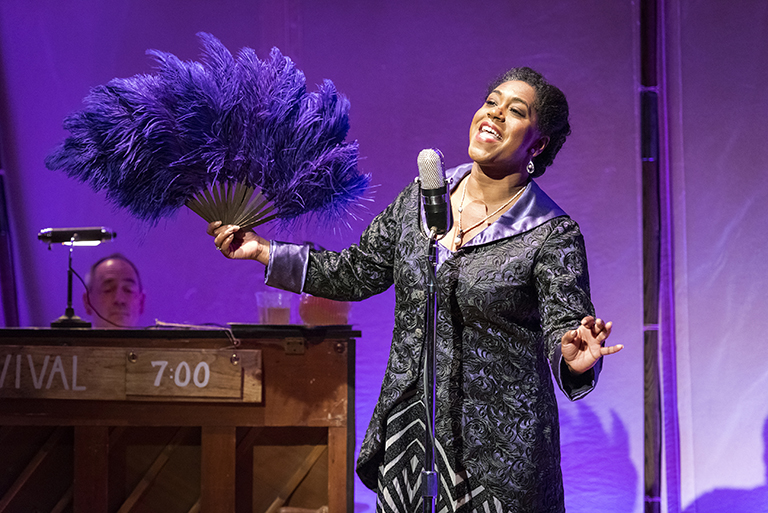“His Eye is on the Sparrow” is a spellbinding story about Ethel Waters, a jazz singer born into poverty in Philadelphia back in 1896. Her love for music, comedic nature and by-any-means-necessary attitude did not let her live in dearth. She was able to soar past her early dreams of becoming a rich white woman’s maid, to a successful jazz star, with a slight reputation of being difficult that, most times, worked in her favor.
As the lights lit the stage, it reminded me of a simple old church revival. There was one wooden piano accompanied by wooden benches and floor. I immediately felt a religious presence. Not an overwhelming one, but enough to bring me into the moment.
Ethel Waters. I knew the name, but did not know the story. I could remember my grandmother and her mother playing her music. Back then, my young ears knew nothing of the pain and happiness she sang and how those notes hit everything so perfectly. I didn’t know her childhood ended at 13 when she was married to an abusive man on the premises of not becoming a whore. I couldn’t fathom how scared she was to survive an awful car accident, wake up in a mental asylum, escape to a hospital for Blacks to almost have her leg amputated. I couldn’t envision her horror of seeing the aftermath of a lynching, and having to flee her own gig because she might be next. I couldn’t imagine being a woman and constantly searching for love, when you don’t even know what it is yourself.

One thing that rang in my head while watching Torie Wiggins play her character, is that this woman just didn’t have a heart. I knew she could feel hurt, pain and happiness from the way her voice sailed smoothly from her lips. But I don’t believe her heart ever felt these emotions. It wasn’t connected. She survived three marriages, without the child that she so desperately wanted. Even though her mother did not give her the love she deserved as a child, she still made arrangements to care for her until the day she died. She navigated through racial tensions in the Jim Crow error demanding respect and the same treatment as the “white folk” she shared stages with. Ethel Waters was nothing short of strong, determined and courageous. She was barrier-breaking. She was spontaneous. She was loud. Yet, she didn’t know what love was.
She yearned for it, and even when received it from one of her husbands she didn’t recognize it. She simply did not how to love. As women, we are known for being loving and maternal. These are usually characteristics we are taught from a young age. I do not have any children, but I know and to the best of by ability understand what love is and with these feelings can’t wait to bring a life into this world. Rounding the end of the play, I anxiously wanted Ethel to find love.
Well, she found it in food. She gained over 200 pounds and in return received diabetes. It soon became hard for her to stand for periods of time and she was too big for chairs. Finally, she let white Preacher Billy Graham in her life. The reason I make the distinction of his ethnicity is that Ethel didn’t believe they knew the same God, with her being a Black woman. Billy set her straight, telling her God is who you believe him to be and he loves everyone who believes in him. From there, Ethel sang in his crusades and was surrounded by people that wanted to do nothing but uplift her. People who wanted nothing from her but to believe in her. She became healthy and happy again.

Now, Ethel never limited her vocal ability to just jazz. She sang all over on different tours on the black circuits, and the white circuits. Inevitably, she made more money in the white circuits — concerts, Broadway performances, Hollywood movies and TV appearances.
Ensemble Theatre has an interactive wall where playgoers can listen to old Ethel Waters interviews and songs. Snippets of Sweet Mama Stringbean and Birmingham Bertha play softly in provided headphones. There are also snippets of her performance interview for Mamba’s Daughters, and Billy Graham — the white preacher who saved her.
Marissa Staples is a Cincinnati published author and writer for The Voice of Black Cincinnati. She developed her love of arts from her mother, Kandi. Being a native of Cincinnati, she loves to travel. If she is not traveling, you can find her reading, writing, volunteering or drinking wine. Wine always brings smiles, friends and creative dialogue.